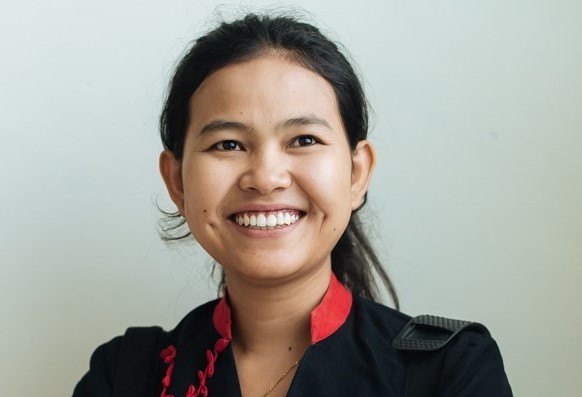
Kyi Pyar Soe is Communications Officer for The Union Office in Myanmar. Her interest in tuberculosis (TB), HIV and infectious diseases was piqued while she was studying nursing:
“During my training I visited the local TB hospital, an experience which gave me valuable insight into the disease. Myanmar is ranked as high-burden for both TB and HIV incidence, and therefore has a high rate of HIV-TB co-infection, which dramatically increases mortality rates. If you then consider the stigma associated with TB and HIV in our country, it becomes apparent that the public health gains to be made by tackling TB and HIV-associated deaths are enormous.”
Kyi Pyar graduated in Nursing Science in 2010 and joined The Union in 2011, initially working on The Union’s pioneering active case finding project in Mandalay, the Programme to Increase the Catchment of Tuberculosis presumptiveS (PICTS), and HIV-TB collaborative activities with volunteer networks.
Then, after three years’ experience in the TB field, Kyi Pyar moved into communications: “At the start I needed to learn a lot about communications; it was challenging, but I was motivated to expand my knowledge of HIV and TB, including its drug-resistant forms. I now manage all the communications work in Myanmar, and I feel I am able to make a valuable contribution to the elimination of these diseases.”
The Union Office in Myanmar works in close collaboration with the Myanmar Government Health Services. The office provides practical and technical support to the National AIDS Programme and National TB Programme (NTP), to care for and treat people with TB and HIV.
“The impact we are having in the country is very significant,” comments Kyi Pyar, “Our active case finding activities in 13 townships affect 3.2 million people. Our PICTS project, which focuses on bolstering community-led efforts while providing technical assistance to the NTP, resulted in nearly 60 thousand presumptive TB cases being referred by volunteers. The IHC Programme, providing anti-retroviral therapy, treatment for opportunistic infections and HIV prevention activities, is implemented in 38 Townships covering 7.8 million people, with 33,544 people currently receiving ART through the programme.”
The impressive statistics speak for themselves. Because the delivery of health services is challenging in Myanmar, The Union has adopted a ‘bottom up’ community approach. This approach uses volunteer networks in case detection, treatment and prevention, focusing on the training and personal development of volunteers, with Kyi Pyar herself contributing to training on communications skills.
Kyi Pyar is the focal point for the development of IEC (information, education and communications) materials, which have been recently expanded to include a COVID-19 response. IEC uses communications to promote better health for communities. Kyi Pyar elaborates: “Effective IEC combines strategies, approaches and methods that enable individuals, families, groups, organisations and communities to play active roles in achieving, protecting and sustaining their own health, and ultimately raising the level of health literacy among the general public.”
Despite the COVID-19 pandemic, Kyi Pyar and the team in Myanmar are striving to provide uninterrupted and quality health care services to its beneficiaries. Social distancing and movement restrictions are having an impact on Kyi Pyar’s ability to conduct field visits, and she has experienced delays in gaining governmental approval for further IEC development. However, despite the environment, Kyi Pyar retains an inner calm and looks forward to the future, working with the team to align The Union’s future global priorities with the country’s needs.
Kyi Pyar’s desire to help others is apparent in her involvement with important communities outside of The Union. She works with organisations that deal with sexual and reproductive health, non-communicable diseases, and youth mental health projects.
“Through the personal stories I encounter, especially in the fight against TB and HIV, I love to see the impact we have on the people we serve. It is a great source of inspiration and motivation for me.”
